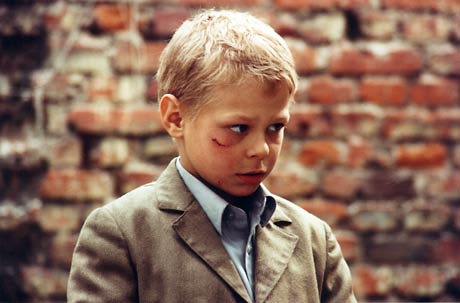Six-year-old Vanya (Kolya Spiridonov) lives in an orphanage under the inefficient care of its manager (Yury Itskov) and adoption agent Madam (Maria Kuznetsova). The children have their own organisation, headed by their eldest, doing odd jobs around the town, cleaning cars and selling their bodies to gain money for a collective fund.
When Madam brings an Italian couple to the orphanage and fixes them on Vanya, whom they plan to adopt, the other children nickname him Italian, and speak of how lucky he is, but after seeing the mother of a recently adopted boy attempt to get her child back from the manager, he decides he must escape the orphanage in search of his own mother.
As with Truffauts 400 Blows, Kravchuks film finds its emotional centre in its lead childs performance. In recent memory, successful child performances have been rife with absence Yusuke Sekiguchis Masao in Kikujiro endorses the power of subtle gestures, and is a largely absent central character. Spiridonov is an unwavering presence, glimpsing both the depths and heights of the Russian orphan experience. The character of Vanya is also used in much the same way Chukrai used Alyosha in his Ballad of a Soldier Vanya is not only a vehicle to discuss the social problem pressing most apparently on his life, he is an articulation of the broken dreams of his countrymen. He encounters these in the two orphan managers, who tell him of their own career dreams that end in a reawakening to their impoverished situations.
The Italian has such a compelling atmosphere inside of the orphanage that when the film transitions out into the world it loses some edge. Even being pursued by police outside of the orphanage hasnt the tone of danger that living inside it has, and this is a testament to the genuine terror of this situation that Kravchuk exposes.
The final moments of the film, including a tense pair of encounters between Vanya and Madams henchman Grisha (Nikolai Reutov), offer unexpected and deeply affecting revelations. (Mongrel Media)
When Madam brings an Italian couple to the orphanage and fixes them on Vanya, whom they plan to adopt, the other children nickname him Italian, and speak of how lucky he is, but after seeing the mother of a recently adopted boy attempt to get her child back from the manager, he decides he must escape the orphanage in search of his own mother.
As with Truffauts 400 Blows, Kravchuks film finds its emotional centre in its lead childs performance. In recent memory, successful child performances have been rife with absence Yusuke Sekiguchis Masao in Kikujiro endorses the power of subtle gestures, and is a largely absent central character. Spiridonov is an unwavering presence, glimpsing both the depths and heights of the Russian orphan experience. The character of Vanya is also used in much the same way Chukrai used Alyosha in his Ballad of a Soldier Vanya is not only a vehicle to discuss the social problem pressing most apparently on his life, he is an articulation of the broken dreams of his countrymen. He encounters these in the two orphan managers, who tell him of their own career dreams that end in a reawakening to their impoverished situations.
The Italian has such a compelling atmosphere inside of the orphanage that when the film transitions out into the world it loses some edge. Even being pursued by police outside of the orphanage hasnt the tone of danger that living inside it has, and this is a testament to the genuine terror of this situation that Kravchuk exposes.
The final moments of the film, including a tense pair of encounters between Vanya and Madams henchman Grisha (Nikolai Reutov), offer unexpected and deeply affecting revelations. (Mongrel Media)
